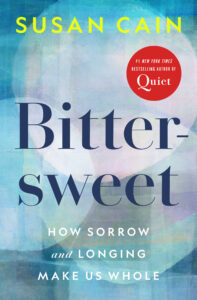
By Susan Cain
Reviewed by Ann Hedreen
Not everyone might be drawn like a magnet to a title like Bittersweet, let alone the subtitle of How Sorrow and Longing Make Us Whole. But I was. I am a fan of Susan Cain’s first book, Quiet: The Power of Introverts in a World That Can’t Stop Talking (2012), and I sensed that Bittersweet might be an intriguing follow-up. This is especially true in 2022, when many of us have experienced more sorrow and longing in the past few years than, perhaps, in any previous era of our life. And so we know firsthand that with sorrow and longing comes meaning and “poignance”— a particularly popular word, Cain writes, among those of us in the second half, or third, or final lap of life.
Poignancy “happens when you feel happy and sad at the same time. It’s the state you enter when you cry tears of joy,” Cain writes. As we get older, we “start to focus on what matters most, stop caring so much about ambition, status, and getting ahead. You want the time you have left to be charged with love and meaning.”
In the introduction to Bittersweet, you’ll find a quiz, which includes questions like: “Do you feel elevated by sad music? Do you tend to see the happiness and sadness in things, all at once?” I chafed a little: I wanted to read, not take a quiz. But then of course I took it, and I thought, clearly, I need to read this book. Because this is me. Not just me now, but me all my life. Yes, I love laughter and joy. But I am also, and always have been, drawn to sad music, poetry and art, and yes, I also “tear up easily at touching television commercials.”
Cain dives deeply into what she and many psychologists call the “tyranny of positivity” that pervades American culture. She also tackles another American trope, “effortless perfection,” which demands that we “appear like a winner without needing to try.” She sits in on workshops with psychologist Susan David, who is dedicated to helping others accept and integrate their difficult emotions. “You might think you’re in control of unwanted emotions when you ignore them, but in fact they control you,” David tells her audiences. “Internal pain always comes out. Always. And who pays the price? We do. Our children, our colleagues, our communities.”
Cain weaves stories from her own life—some heartbreaking, some funny, all of them poignant—throughout the book, which gives Bittersweet an intimacy and feeling of deep honesty. She shares poetry and lyrics that have moved her, from contemporary singer-songwriters to the Sufi poet Rumi. “This longing you express/ is the return message,” Rumi wrote, seven centuries ago. “The grief you cry out from/ draws you toward union.”
I am grateful to Susan Cain for reminding us of these and other bittersweet truths. And for reminding us that acknowledging the bittersweet currents in our lives can be so unexpectedly uplifting.

